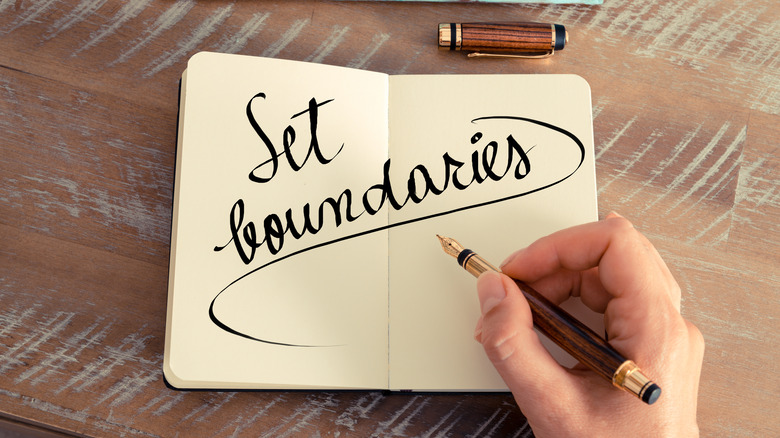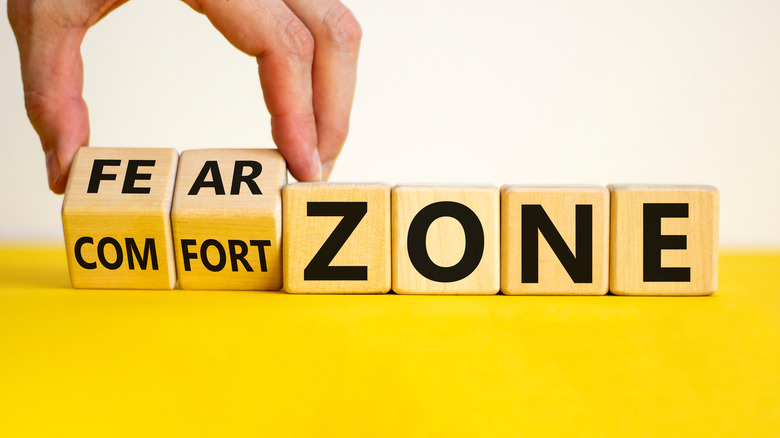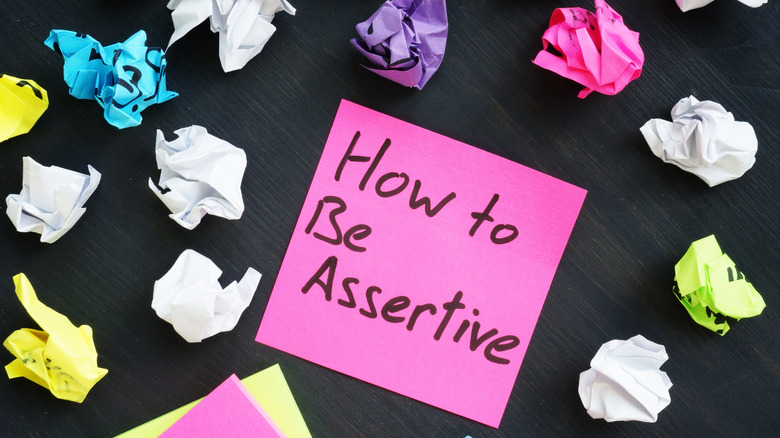What Are Healthy Boundaries And How Can You Set Them In Your Relationships?
We all have our limits, and being able to effectively communicate those limits is immensely valuable for improving our quality of life. It can be tough to say no to someone when they ask us for something, and it can even trigger unwanted feelings of guilt or fear. However, there are moments when it would be better for us to decline someone's request if it means preserving our energy and protecting our mental health. During these times, knowing how to set personal boundaries with others may come in handy. Even so, it is not always obvious what boundaries are or how to set them in our relationships.
The scientific study of boundaries is fairly recent, but the topic is becoming increasingly more recognized. In 1966, the proxemic theory was formulated by anthropologist Edward Hall to describe the metaphorical bubble humans create around themselves to safely distance themselves from others (per Regents of University of California). As further reported in a 1993 review published in Perspectives in Psychiatric Care, having appropriate boundaries is necessary because they prevent an individual from feeling overwhelmed by stimuli in their environment. Self-reflecting on how much distance you may need could help you begin to set these boundaries with others, as personal space needs vary from person to person. Above all, learning how to establish healthy boundaries starts with gaining an understanding of what they are, and the various types that you can set with others.
What types of boundaries are there?
Recognizing boundaries may not be straightforward, as it is a broad term. As explained by PsychCentral, there are actually different types of boundaries to consider. The most apparent boundaries may be the physical ones, and they embody the metaphoric bubble that Edward Hall elaborated upon. The ability to assert physical boundaries is needed because they help protect you in situations where you may be uncomfortable, like when someone borrows your items without asking. Sexual boundaries sometimes go hand-in-hand with physical boundaries and allow us to express what intimate behavior we are comfortable or uncomfortable with, as well as whom we choose to engage in those behaviors with. They preserve your autonomy and the autonomy of others, so noticing what behaviors bring discomfort and alerting your partners to them could help you feel safer.
Along with external boundaries, we can have more internal boundaries. One example is emotional boundaries, which also improve trust in relationships. These kinds of boundaries are for protecting your energy in situations where it might feel depleted (per MindBodyGreen). Sometimes, this might mean telling your friend that you don't have the energy to listen to them vent or help them with a task. This doesn't mean that you don't love your friend, it simply means you could need more time for self-care. Everyone deserves to feel safe within the home of their bodies, so communicating your boundaries and acknowledging the boundaries of others is a great sign of mutual respect.
What stops people from setting boundaries?
It is well known that humans have deep-rooted survival instincts, just like other animals. In order to survive, the body is wired to adapt whenever something in our environment presents a threat. Therefore, it is understandable to feel intimidated when it's time to set a boundary with someone. As a method of avoiding fear and intimidation, it could feel safer to fall into the habit of people-pleasing. People-pleasing is a behavioral pattern of neglecting your own needs to appease the needs of others (per WebMD). Individuals who exhibit these patterns are extremely agreeable and conform to the beliefs of others, even if they clash with their own. Perhaps someone who people-pleases doesn't enjoy the country music genre, but it's their new date's favorite. In this scenario, they could pretend to like the genre in order to gain approval from their potential partner, even if they dislike it deep down.
The short-term benefits can seem comforting as they appear to be preventing social rejection, but in a sense, someone who struggles with these behaviors could be sacrificing their true selves by pretending to be someone they're not. As further described by WebMD, we could be falling into people-pleasing habits when we apologize for things that aren't our responsibility or when we have difficulty saying no to others. It's also not uncommon for someone who gravitates towards people-pleasing to blame themselves when something bad happens, even if they have no control over the situation.
Consequences of not setting boundaries
While empathy and caring for others are wonderful traits, sacrificing your own needs to please everyone else can become detrimental to your health. It can deplete someone's energy and potentially lead to burnout if they are constantly doing for others without taking time for their own self-care. Burnout is a state of fatigue and extreme stress that can happen when someone is overloaded with life responsibilities (per WebMD). Becoming burnt out can undermine someone's performance at work or at home, and can evoke feelings of resentment toward one's job and colleagues. Physical issues such as stomach or bowel upsets are signs of burnout. In Psychology Today, it was reported that individuals with loose boundaries may take on more work than they can reasonably handle, causing them to feel stressed and more likely to burn out.
People in caring professions, like doctors or social workers, are especially susceptible to burnout. This means that finding ways to prevent burnout and alleviate the stress associated with these professions is of critical importance. In a 2013 study published in the Journal of the Association of American Medical Colleges, many physicians reported that establishing clear boundaries between themselves and their patients was essential to preventing burnout. In fact, it was noted these boundaries actually made the doctors more effective at their jobs and resulted in long-term patient-doctor relationships. Additionally, they described the importance of setting clear boundaries with their colleagues and taking time away from the job for self-care.
How to know when you need to set a boundary
Interestingly, your body will send warning signals when it wants you to set a boundary with someone in your environment. This is why it could be helpful to become in tune with your body, so you can feel what it is trying to communicate to you. As specified by PsychCentral, a violation of a boundary can be indicated by your emotions. Emotions are messengers, and they can provide valuable insight into what we need and what we care about. For example, it is very common to feel anger or resentment toward someone who has invaded your personal space. You could experience a fight, flight, freeze, or fawn stress response, and may feel tempted to argue with the person who hurt you or distance yourself from them altogether (per MindBodyGreen).
According to Psyched in San Francisco, the emotion of anger serves an evolutionary purpose. Although the outward expression of anger is perceived as unacceptable in many cultures, feeling anger is needed as it provides an important indicator that your boundaries have been violated in some way. Unexpressed anger that is ignored can lead to feelings of resentment, which can potentially damage and sabotage personal relationships (per PsychCentral). Practicing effective communication skills and acknowledging disagreements as they come up is one method to prevent harboring resentments. Avoiding interpersonal issues may feel safer, but in the long run, it can do more harm than good to everyone involved.
How to set boundaries
Implementing boundaries doesn't mean you will have to offend others with your decision. In fact, you could maintain your sense of self-respect and strengthen your relationships by doing so. We are being more authentic and honest when we communicate our limits to our loved ones, which will improve our relationship with them and with ourselves.
One step to setting boundaries is to first figure out what your limits and values are, as stated by PsychCentral. This requires self-reflection to notice where you feel uncomfortable or resentful in your relationships. Wherever you feel angry, hurt, or resentful is a great opportunity to set a boundary. When it's time to set the boundary, practicing what to say beforehand might help ease some anxiety. Verywell Health recommends using "I" language over "you" language since it can make people less defensive, and is less likely to start an argument. For example, one could say, "I feel uncomfortable when someone borrows my things without asking. I would appreciate being asked next time."
By respecting your own needs and equally respecting the needs of others, you apply assertive communication instead of passive, passive-aggressive, or aggressive communication (per Mayo Clinic). According to the clinic, being assertive comes with an array of personal and social benefits. You may notice an increase in your self-esteem and confidence, and you could become more respected socially. You might develop more authentic and vulnerable social connections, and you won't have to abandon yourself to gain approval from others.






